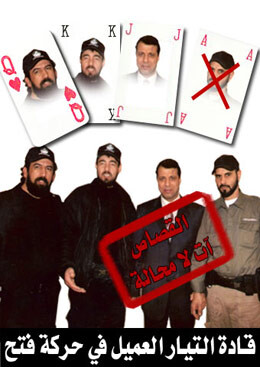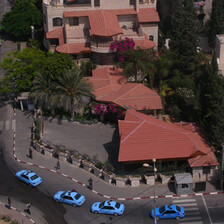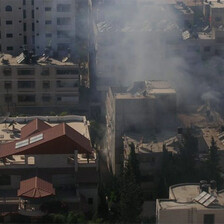
An image presumably distributed by Hamas sympathizers reads, “Punishment has come/ The leadership of the collaborationist faction in Fatah.”
1. Carry out democratic elections
2. Determine a government according to the election outcome
3. THEN isolate this government in one part of the country
4. Set an illegal embargo on the people there
5. Freeze the government’s bank accounts
6. Isolate the government internationally
The result will be:
1. The return of all stolen taxes belonging to Palestinians
2. An easing of roadblocks and security measures
3. Lifting of the illegally imposed economic embargo
4. International funding for a new non-democratically determined government
5. Normalization of relations between international governments and the non-democratically determined government
6. The legalizing of private American trade (the world’s largest economy) with Palestinians (previously this deed could result in incarceration)
7. The releasing of a political prisoner (with four life sentences) to strengthen the non-democratically determined government
To try and bolster this two-faced US foreign policy position in the Middle East, the US Secretary of State said Monday:
“Through its actions, Hamas sought to divide the Palestinian nation, we reject that. It is the position of the United States that there is one Palestinian people and there should be one Palestinian state.”
In reality is it not Israel and the US that are dividing the Palestinians by politically immobilizing their elected leaders?
On Tuesday White House spokesman Tony Snow was reported saying, “What’s important is, you have to have a partner who is committed to peace, and we believe that President Abbas is. And therefore we are committed to working with this new emergency government.”
A source in the prime minister’s entourage in the US explained, “We want to make Hamas a pariah and prevent it joining the international game.”
Hamas’ violent takeover of the Gaza Strip last week resulted in two governments: the Hamas leadership headed by deposed Prime Minister Ismail Haniyeh in Gaza and a new emergency cabinet led by the Western-backed economist Salam Fayyad in the West Bank. Both are calling the other the perpetrators of a coup.
What are the sources of this division?
A fear overtook the Gaza Strip after Hamas took control of institutions this past week, which are rightfully theirs to control. The US and Israel’s anticipated and proclaimed reaction to the latest round of events (a democratically elected government taking over government institutions) is causing fear and uncertainty concerning Gazans’ future plight. Few outside realize that the Gaza Strip can hardly be more isolated, or sink into a worse economic depression, save starvation, than it has in the past two years.
Many in Gaza consider the emergency government to be legitimate, for the sole reason that the world, not the majority of Palestinians, actually recognizes the new political entity (in the last parliamentary elections the new prime minister’s party received 2.4 percent of vote).
The colonial tactic of conquer and divide is being put to use on the Palestinians yet once again; initially in the Gaza Strip between Fatah and Hamas and now between the West Bank and Gaza.
This image, presumably developed by Hamas (recalling the American deck of cards of their most wanted in Iraq), paints a vivid picture of the deep seeded divisions in Palestinian society.
Why was Hamas so determined to wipe out this “collaborative cell in Fatah”? To just touch on this question brings to the surface the deck’s Ace, a Dahlan funded hit man called Samih al-Madhoun, nicknamed “al-Maleoun” (the cursed one) by many Hamas supporters. In the past weeks Hamas systematically executed his companions and leaders and finally Samih himself after this small group of fighters wreaked havoc in their neighborhood in the northern Gaza Strip.
Palestinians are more divided and polarized than ever which can be seen in their reaction to last week’s events. Each side is pointing out the ultimate blame in the other. Haaretz reported this account from a Fatah member who had fled Gaza,
“Hamas believes that nothing will stop them from rising to power. Everything is legitimate: to kill, burn, torture. Three people from National Security were decapitated with a knife, the way they do in Iraq. They cut off the legs of Samih al-Madhoun [a senior Al-Aqsa Martyrs’ Brigades figure] after they killed him. They are animals.”
My neighbor Ayman, a Hamas supporter, was kidnapped by Samih one week before the latter was executed. Ayman was beaten and taken to the beach to be shot. His oldest brother, himself a Fatah activist, saved his life by calling the perpetrators and pleading for his younger brother’s life, many others were not as fortunate.
“Civil war” has often been uttered prematurely in the media, yet last week’s kidnappings, lootings and murders now taking place on a tit-for-tat basis between West Bank Fatah men and Hamas activists in Gaza demonstrate this new reality. Samih and his companions were used to sow division between Palestinians.
Part of a conquer and divide strategy is timing. Why did Israel wait until this moment to consider Mahmoud Abbas a “partner committed to peace” when his positions have hardly changed since his election over two years ago? Why is Israel only now considering freeing Marwan al-Barghouthi, a convicted Fatah activist? Why only now release the frozen government taxes ($570 million) that the Palestinians have desperately needed since Israel started withholding them in March of last year?
On Monday Haaretz’s Akiva Eldar wrote, “If Ariel Sharon were able to hear the news from the Gaza Strip and West Bank, he would call his loyal aide, Dov Weissglas, and say with a big laugh: ‘We did it, Dubi.’ Sharon is in a coma, but his plan is alive and kicking. Everyone is now talking about the state of Hamastan. In his house, they called it a bantustan, after the South African protectorates designed to perpetuate apartheid.”
Just as in the Palestinian territories, blacks and colored people in South Africa were given limited autonomy in the country’s least fertile areas. Those who remained outside these isolated enclaves, which were disconnected from each other, received the status of foreign workers, without civil rights. A few years ago, Italian Foreign Minister Massimo D’Alema told Israeli friends that shortly before he was elected prime minister, Sharon told him that the bantustan plan was the most suitable solution to our conflict.
Although Mahmoud Abbas and his new US backed government have finally received international status and the economic blockade is being lifted on Palestinians, the Palestinian cause seems to have been buried beneath the rubble. With internal division more than ever in the limelight, the source of all this mess, the atrocities carried out against Palestinians dating back to the early 20th century, solidified in 1948 and ongoing land theft, colonial expansion and disregard of Palestinian human rights are forgotten amidst the chaos.
The Palestinians are more divided than ever, distracted by wrongs carried out against each other.
The plot of conquer and divide is a great smokescreen covering up the desecration of democracy and another attempt to lay to rest the Palestinian cause.
Philip Rizk is an Egyptian-German who has lived in Gaza since August 2005 where he works and writes. Philip runs a blog: tabulagaza.com.
Related Links




